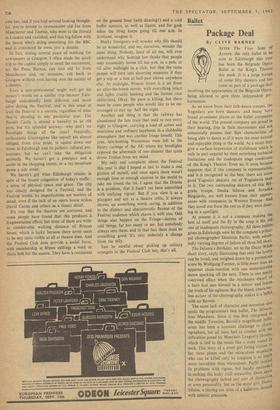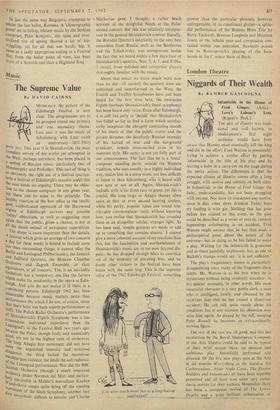Ballet
Package Deal
CLIVE BARNES By
As we know from their folk-dance troupes, the Yugoslays are born dancers and many have found prominent places in the ballet companies of the world. The present company are Proud in their bearing, free in their movements and not unnaturally possess that Slav characteristic of being able to dance as if it were the most natural and enjoyable thing in the world. As a result they give a surface impression of stylishness which is only in part negated by their surprising technical limitations and the inadequate stage conditions of the King's Theatre. Even so, it soon became apparent that if this company is representative, and it is recognised as the best, there are more good Yugoslav dancers Jut of Yugoslavia than in it. The two outstanding dancers of this Bel- grade troupe, Duska Sifnios and Jovanka Biegojevic, are well known from their appear- ances with companies in Western Europe. And they stood out from the rest as if they were danc- ing in a spotlight.
At present it is not a company making the best of itself and the fly in the soup is the old one of inadequate choreography. All three ballets given in Edinburgh were by the company's princi- pal choreographer Dimitrije Parlic; with admit- tedly varying degrees of failure all three fell short. The Infanta's Birthday, set to the Oscar Wilde short story, coyly illustrating that only the lovely can be loved, and weighed down by a portentous score by Wolfgang Fortner, is little more than an apparent chain-reaction with one unmemorable dance sparking off the next. There is one neatly contrived effect when the misshapen dwarf of a hero first sees himself in a mirror and learns the truth of his ugliness. But the bland, character- less nature of the choreography makes it a ballet with no flavour.
The same lack of character and invention also spoils the programme's best ballet, The Miracu- lous Mandarin. Since it was first composed in the middle Twenties, Bartok's magnificent ballet score has been a constant challenge to chore- ographers, but all have had to combat with the difficulties posed by Menyhert Lengyel's libretto, which is tied to the music like a stone round i.ts neck. This story of a street girl luring victims to her three pimps and the miraculous mandari? who can be killed only by kindness Is so rrnieh more incredible than miraculous. Parlic tackled its problems with vigour, but hardly succeed11 in making this leaky craft seaworthy. Once again the choreography lacked any sort of distinction or even personality, but as the street girl. Duska Sifnios, a blaring sex siren of a ballerina, danced with athletic precision. In just the same way Biegojevic attempted to rescue the last ballet, Kostana. A 'choreographic 1)°eM' set to folksy, blatant music by the Serbian composer, Peter Konjovic, this tame and over- civilised rite of spring showed a lot of hip- Wriggling, yet for all that was hardly hip. It came as a sadly appropriate ending to a Festival that, from the ballet point of view, has been more of a Scottish reel than a Highland fling.



































 Previous page
Previous page